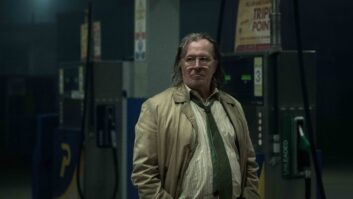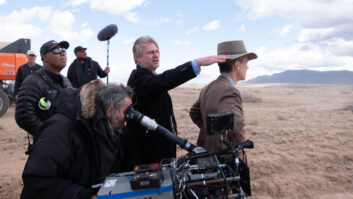The 13th Rory Peck Awards, a competition featuring 60 pieces of freelance broadcast reporting from 20 countries, highlighted an increasing level of ‘self commissioning’, the bravery of fixers and drivers, and a new type of Russian Roulette. Very much the ‘news behind the news’ – and proof that investigative journalism is thriving – the Peck Awards consists of three judged categories, and a special prize in memory of Martin Adler, writes George Jarrett.
The Hard News category was won by Farah Roble Aden, for the stunning frontline war coverage he fed to Reuters TV under the underwhelming title ‘Somalia Reports’. Aden managed to get his camera within feet of vicious street fighting in Mogadishu between the Islamic courts militias and Ethiopian-backed Somali government troops.
Spelling out the dangers he said: “Two of my colleagues were killed on the same day. I tried to cover both sides of the conflict, although it was very dangerous. Local journalists are targeted, but international journalists would be at even greater risk. Even my family is in danger. We have to move around all the time.”
The Features category was won by Sean Langan for ‘Fighting The Taliban’, which was produced by October Films for C4. “I shot with the Taliban first, and the British found it very hard to take initially,” Langan said. “Your friend’s just been killed, and then you meet a journalist who says he has filmed with the enemy.
“It is not all tea and interviews when you meet the Taliban,” he added. “The first time I met them, they were very close to killing me. The British understood as well that apart from my own risk, it is a benefit to see both sides of any story. I am going back, but I feel like I am playing Russian roulette. You keep adding another round if you go back too many times.
The Sony Impact Award went to the Australian journalist Elizabeth Tadic for ‘Malaria, Money and Murder’. She sent herself to Nigeria to expose the deadly impact of fake drugs. “I didn’t recognise what I was getting myself into. You cannot just pull out a camera in public in Nigeria,” she said. “I first filmed some sick children with malaria, and on the way to interview [Drugs Regulator] Dr Dora Akunyili I was car-jacked. That freaked me out, but once I hooked up with Dr Dora I felt safe. She has 12 bodyguards and a bulletproof car!”
Introducing the Martin Adler prize, Peck Trustee Tira Shubart focussed on fixers and drivers. “What we call a story, they call their lives,” she said. “Fixers light up landscapes.”
The winner, Vitek Oketch, lives in Gulu, a part of Uganda that lost many thousands of children to Joseph Kony’s Lords Resistance Army. He said, “It is with great luck that I stand before you as a living witness of the war.”






